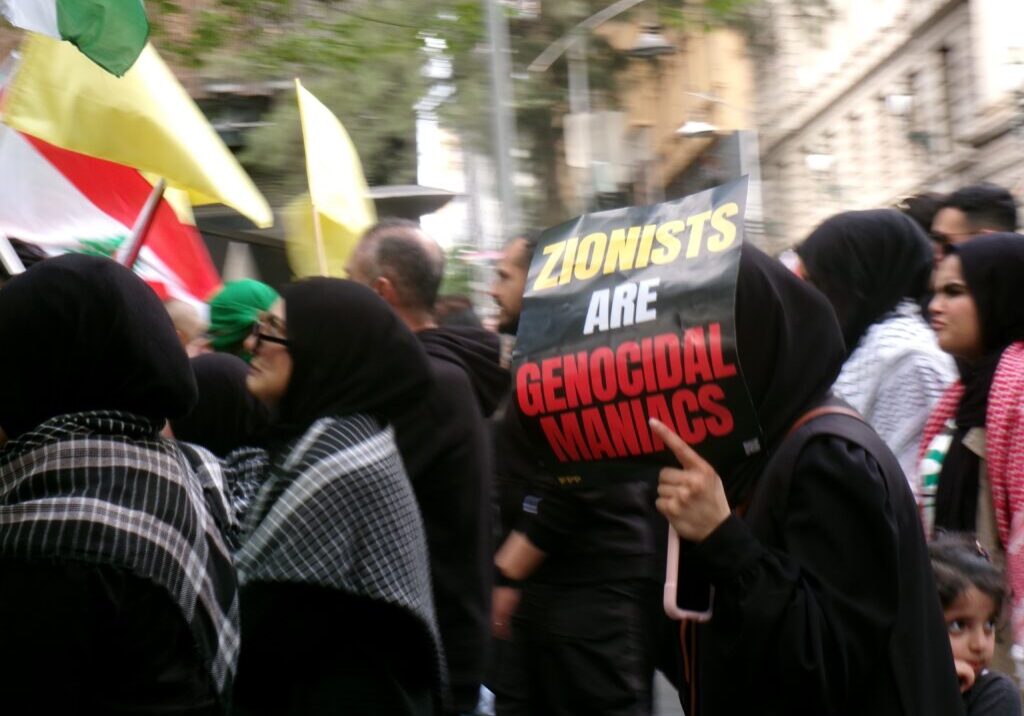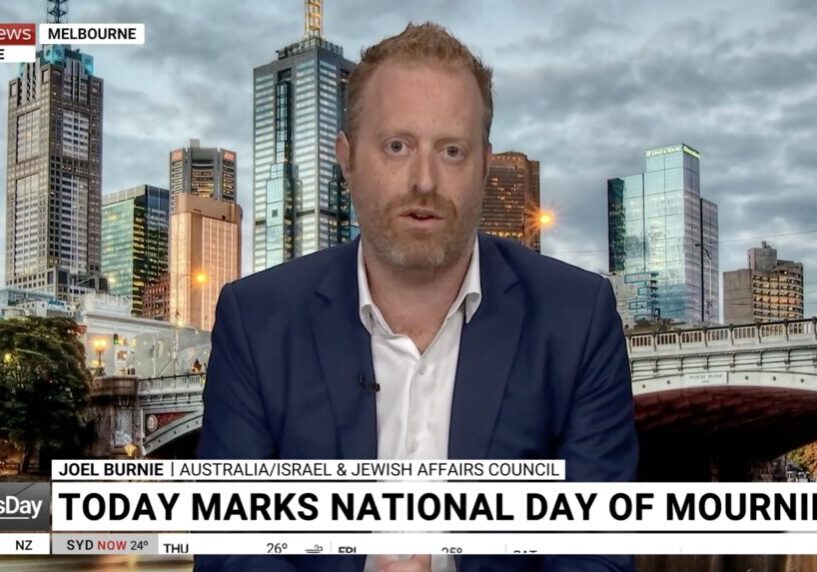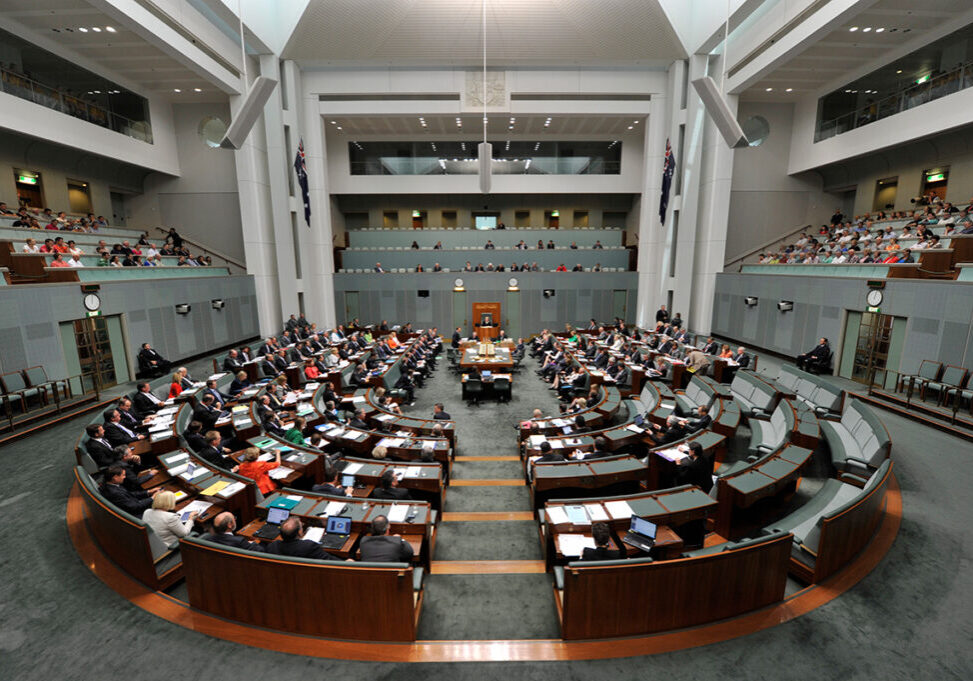Australia/Israel Review
Noted and Quoted – May 2021
Apr 27, 2021 | AIJAC staff

On the floor
On March 31, the Australian reported on allegations that the ALP’s National Conference denied dissenting voices the right to speak against the introduction into the party platform of language calling on a future Labor Government to recognise a Palestinian state.
The paper quoted former Labor MP Michael Danby accusing the conference of not only “adopt[ing] former UK Labour leader Jeremy Corbyn’s plan for ‘unconditional recognition of a Palestinian state but also his Stalinist methods by suppressing debate on the foreign policy motions.’”
Danby was also quoted criticising the adoption of the resolution, saying it “associat[es] Labor with a homophobic, undemocratic, kleptocratic, misogynist Palestinian regime.”
According to the report, Australia Palestine Advocacy Network President George Browning said, “by recognising Palestinian statehood, Labor will encourage both Israeli and Palestinian moderates that are working towards a peaceful end to the conflict.” Given the Palestinian leadership is split between Hamas, which refuses to ever make peace with Israel, and the Palestinian Authority, which has refused to negotiate peace with Israel for several years, this seems like wishful thinking.
Other voices
On ABC Radio National “Breakfast” (March 31), Labor Leader Anthony Albanese said the party’s position remained unchanged from the policy it took to the 2019 election, despite the platform change. Albanese said “Labor supports a two-state solution,” adding “but… the dispossession of Palestinians can’t continue into the future and… the international community has to play a role in a peaceful resolution of the Middle East conflict”.
Host Fran Kelly did not ask how unilateral recognition of a non-existent Palestinian state would achieve that.
Former ALP president and subsequent Liberal party candidate Warren Mundine told guest host Rita Panahi on the Sky News “The Kenny Report” (March 31) that the resolution ignores the advances made by the Abraham Accords in the last 12 months and that Hamas is aligned with the “mullahs of Iran who [are] the biggest exporters of terrorism in the Middle East and globally.”
Liberal doses
Appearing on Sky News “Credlin” (April 1), former Liberal Foreign Minister Alexander Downer said the resolution was “virtue signalling” for “branches in Western Sydney” and the ALP was not taking into “account” the fact that if Israel did not provide security to the Palestinian Authority, Hamas would take over the West Bank.
In her Daily Telegraph column (April 4), Peta Credlin, who served as chief of staff to Tony Abbott while he was prime minister, condemned the ALP resolution, saying that “despite being the only place in the Middle East with robust free speech and full protection of minority rights (including the much persecuted Arab Christians), many zealots in Labor’s ranks view Israel as a ‘rich oppressor’ that deserves routine condemnation in the UN and elsewhere. This is despite one of the truly under-remarked achievements of the Trump era in brokering deals for four Arab nations to formally recognise Israel; something not even arch-optimists thought they would see a decade ago. It says everything that Labor, here, is more anti-Israel than Arab neighbours, there, doesn’t it?”
On Sky News “Bernardi” (April 16), the Institute of Public Affairs’ Gideon Rozner said the Palestinian leadership has rejected opportunities to establish a Palestinian state since the 1930s if it has meant accepting the existence of a Jewish state, too. He also ridiculed the idea that settlements are the reason why there is no peace, pointing out that in 2005, Israel dismantled all 21 settlements in Gaza and instead of using the territory “to build a new land…for their people”, Palestinian terrorist groups fired rockets into Israel.
Elsewhere, the Spectator Australia (April 3) described the resolution supporting “Palestinian statehood without guarantees to protect Israel” as “stupendously naive at best or camouflaged anti-Semitism at worst.”
No more biden time on UNRWA
An SBS TV “World News” report (April 8) on the Biden Administration restoring funding that was cut under its predecessor to the United Nations Relief and Works Agency for Palestine Refugees in the Near East (UNRWA) included a statement that Israel “accus[es] UNRWA of antisemitic activity, it believes the agency should be reformed before funding is restored.”
Gilad Erdan, Israel’s Permanent Representative to the United Nations, was quoted saying, “we believe that this UN agency for so-called ‘refugees’ should not exist in its current format. UNRWA is an organisation that engaged in political advocacy and enables incitement to violence.”
An AFP report in the Australian (April 9) on the renewed funding noted that “Israel argues the education provided by the UN-backed schools includes incitement against the Jewish state” and Erdan wanted funding restored only after “ensuring that certain reforms, including stopping the incitement and removing anti-Semitic content from its educational curriculum, are carried out.”
The report said UNRWA “provides housing, schools and other care to more than six million Palestinian refugees and their descendants.”
The figure of “more than six million” is exaggerated. But more importantly, the report didn’t properly explain how the ability to inherit refugee status for an indefinite number of generations is unique to Palestinians.
Moreover, the majority of the Palestinians on UNRWA’s roll either live under Palestinian self-rule in the West Bank and Gaza or in neighbouring Jordan where they were granted citizenship in the 1950s – which hardly makes them refugees.
Hence, as the story noted, but didn’t elaborate, the Trump Administration did not want to fund UNRWA when it had failed to meet its original mandate to help “permanently resettle” Palestinians.
The story also suggested that previously announced US funding of $US15 million for COVID assistance to the Palestinians was needed because “Israel, a leader in vaccinating its own people, has not taken similar initiatives in territories under its occupation.” Under the Oslo Accords signed between Israel and the PLO, it is the legal responsibility of the Palestinian Authority to vaccinate Palestinians living under its jurisdiction.
A fruitful peace
Writing in the Australian (March 16), former US President Donald Trump’s special Middle East envoy Jared Kushner highlighted some of the extraordinary advances that have followed since the Abraham Accords were signed between the UAE, Bahrain, Morocco, Sudan and Israel in 2020.
Kushner noted that Muslims are visiting Israel “posting pictures of peaceful visits to the Al Aqsa Mosque in Jerusalem, blowing a hole in the propaganda that the holy site is under attack and Israelis prevent Muslims from praying there. Every time Prime Minister Benjamin Netanyahu tweets something positive in Arabic about an Arab leader, it reinforces that Israel is rooting for the success of the Arab world.”
He also noted that the UAE has announced a US$10 billion fund to invest in Israel.
All this, he said, disproves “the myth that [the Arab-Israeli conflict] could be solved only after Israel and the Palestinians resolved their differences” and if the Biden Administration is “smart”, Oman, Qatar, Mauritania and even Saudi Arabia could be next.
One stunt solution
If the Guardian Australia supports a two-state solution and the ongoing existence of the State of Israel, as it claims to, continually publishing op-eds arguing for the exact opposite is a strange way to show it.
On Jan. 13, Guardian Australia ran an extreme piece by Hagai El-Ad, of the far-left non-government organisation B’Tselem, insisting that in Israel, the West Bank and Gaza, “one government rules everyone and everything…working to advance and perpetuate the supremacy of one group of people – Jews… This is apartheid.”
Fast forward to March 19 and the Guardian Australia marked upcoming Israeli elections and Palestinian President Mahmoud Abbas’ announcement that parliamentary elections would be held for the first time in more than 15 years with an op-ed demanding Israel and the territories be replaced with one, presumably Palestinian majority, state.
That op-ed, by Salem Barahmeh, director of the Palestine Institute for Public Diplomacy, promoted a twisted version of history that accused Israel of “ma[king] sure” that the Palestinian Authority never evolved into a Palestinian state.
He also lamented the “political repression” in the PA under Abbas and concluded that “This system cannot offer true democracy and as such must be dismantled. A new social contract must be built where every person can practice true self-determination and is free and equal.”
In other words, he argued that because the Palestinian Authority is not a bastion of liberal democracy, rejected three Israeli offers to create a state since 2000, spurned further peace talks in 2010 and 2014 and the Trump peace process, Israel, which is a genuine democracy, must be dismantled so Palestinians who have a “real hunger” to participate in a genuine “democratic process” can do so.
Ami’s Accusations
ABC Radio National “Religion & Ethics” (March 24) interviewed Ami Ayalon, former head of Israel’s Shin Bet security service and Olmert Government minister, to discuss his new book Friendly Fire, which is highly critical of Israeli government policies on the peace process since the Oslo Accords were signed in the 1990s.
Ayalon explained that he became a dove when he realised that Palestinians are human beings and “what Palestinians really want today, what they are dreaming about is to see the end of occupation.”
Asked if former Palestinian President Yasser Arafat was a partner for peace given the terrorism that occurred under his watch, Ayalon was evasive, saying, “I don’t have a very clear answer.” He acknowledged that after supporting Iraqi dictator Saddam Hussein in the Iraq war, Arafat was forced to embrace diplomacy and “give up the idea of Greater Palestine… But later during the Second Intifada he supported Palestinian violence again.”
Of course, what he didn’t say was that Arafat’s support for violence immediately followed his rejection of an unprecedented Israeli offer to create a Palestinian state at the Camp David Summit in 2000.
Ayalon also bizarrely seemed to suggest Hamas would not be a threat if a Palestinian state were created.
Ayalon accused Israel of practising apartheid on the West Bank, claiming that “if you are a Jewish settler in Hebron you will get much more drinking water than if you are a Palestinian in the same city. So, this is Apartheid, there is no other way to describe it.”
Ayalon must know that most of Israel’s water comes through a combination of reclamation, recycling and desalination plants, not extraction from aquifers. Meanwhile, the Palestinian Authority is in charge of 80% of Hebron and administers the city according to its own rules and regulations. This includes a poor water maintenance system that is replicated across areas of the West Bank under its control. To give one example, the UN acknowledged this month that “sewage from the Hebron Governorate runs untreated through populated areas… causing a substantial damage to the aquifer and the health of the residents.”
A total write off
A bizarre analysis in the Age and Sydney Morning Herald (April 10) implied Israeli PM Binyamin Netanyahu is the main factor in the derailing of the two-state formula for peace between Israelis and Palestinians.
According to Maher Mughrabi, the Age’s features editor, Netanyahu co-opted the support of the racist Israeli far right and “moved the national consensus in Israel further and further to the right.”
Unable to “entirely repudiate” the Oslo peace process, Mughrabi argued that Netanyahu “and his American supporters [have] gradually pushed it into the background, preferring instead the formula ‘peace for peace’; Israel would fortify its position until both the region’s states and the stateless Palestinians accepted its stances on settlement of occupied territory and a final peace as immovable.”
Mughrabi conveniently forgot to mention the generous assistance Netanyahu received in executing his moustache-twirling master plan from Palestinian behaviour, which convinced most Israelis a negotiated two-state peace was not available in the short term. In the 1990s, Hamas launched waves of terror attacks when the Oslo peace process started under Labor. Then, Labor PM Ehud Barak’s 2000 offer to create a viable Palestinian state in 95% of the West Bank and all of Gaza with a capital in east Jerusalem and shared control over holy sites, was rejected and met with five years of mass organised terrorist violence from both Hamas and the Palestinian Authority. And then a unilateral withdrawal from Gaza in 2005 saw thousands of rockets fired from there into Israel.
Bullies in a China shop
Canberra Times columnist Steve Evans (April 3) chided the organisers of an “intentionally confrontational” art exhibition at the Australian National University for including pieces that are “offensive to many Jews,” amongst other groups and individuals, but giving in to “bullies” and censoring a “a satirical piece” portraying Chinese President Xi Jinping as Winnie the Pooh.
According to Evans, “many Jews might take offense at…a picture of a thug (presumably Israeli) holding a man in a chokehold (presumably Palestinian),” with a caption featuring a quote attributed to the Jewish scientist Albert Einstein; “It would be my greatest sadness to see Zionists do to Palestinian Arabs much of what Nazis did to Jews.”
Evans wrote that “it was spoken more than 70 years ago in different times. Today, the comparison of Israel to the Nazis is recognised as an anti-Semitic meme.”
Actually, a Google search of the quote immediately returns the salient fact that there is no evidence Einstein ever said or wrote it. Nonetheless, in recent years this apparently fraudulent quote has frequently appeared as part of misinformation campaigns to delegitimise Israel’s right to exist.
Off base
Following media reports in late March of leaked audio recordings of right wing extremists belonging to a US group called The Base trying to build violent networks in Australia, AIJAC’s Naomi Levin called for an update of Australia’s 2015 counter-terrorism strategy because it barely mentions “ideologically-inspired terrorism,” (Herald Sun, April 12).
Levin pointed out, “the existence of these recordings has been known for some months, as have the links between a former One Nation political hopeful and The Base, an international violent extremist network.”
Indeed, readers may recall Levin raised the alarm about The Base in the Feb. 2021 AIR.
Levin said there is an acute problem in that “the activities of legitimate political actors” are “leading” some “Australians down a path to extremism” using social media platforms, citing One Nation as an example.
Often, these posts are on the “fringe” but “within the realm of acceptable speech.” However, “what is not acceptable is the conversation they generate.”
Levin recommended counterterrorism strategies must acknowledge “just how quickly people can be radicalised to a point where they are contemplating violence” and warned that if only “one of that crowd…take their fringe views further it poses a grave danger to the safety of Australians.”
Meanwhile, in contrast to voices of hate trying to sow the seeds of division, AIJAC’s Jeremy Jones travelled through regional NSW in March to participate in a range of Harmony Week events, and was interviewed by a string of ABC regional radio stations to discuss the success of Australian multiculturalism and the importance of interfaith dialogue as an antidote to hate. Two of his interviews can be heard on AIJAC’s website at www.aijac.org.au.
For The Record
On April 14, Jewish communal news website J-Wire correctly reported that former Labor MP Melissa Parke had “withdrawn her defamation case against Australia/Israel & Jewish Affairs Council Executive Director Dr. Colin Rubenstein in a settlement in which Rubenstein issued a statement expressing ‘regret’ that his comments caused Parke ‘distress’.”
The J-Wire story said Rubenstein’s statement did not apologise for “any of the claims Rubenstein made in April 2019 criticising a controversial speech Parke had made to the WA Labor Friends of Palestine on March 4, 2019. Instead, Rubenstein’s statement said his criticisms ‘were intended to address the accuracy and implications of the statements and claims Ms. Parke had made’ and were not directed at Parke ‘personally’.”
On April 14, the Australian website amended an earlier print report published that day by deleting an incorrect claim that Parke had “won a retraction and apology from Dr. Rubenstein.”
The updated report correctly stated that Parke “has now negotiated a settlement with Dr Rubenstein,” but incorrectly claimed he had “expressed ‘regret’ for making claims of anti-Semitism.”
In fact, Rubenstein’s statement had clarified that his “comments…did not intend to convey” Parke was “an antisemite” and “without conceding that my comments carried the meanings which Ms. Parke claims”, expressed “regret” that “my comments caused her distress.”
Tags: Australia, Media/ Academia






